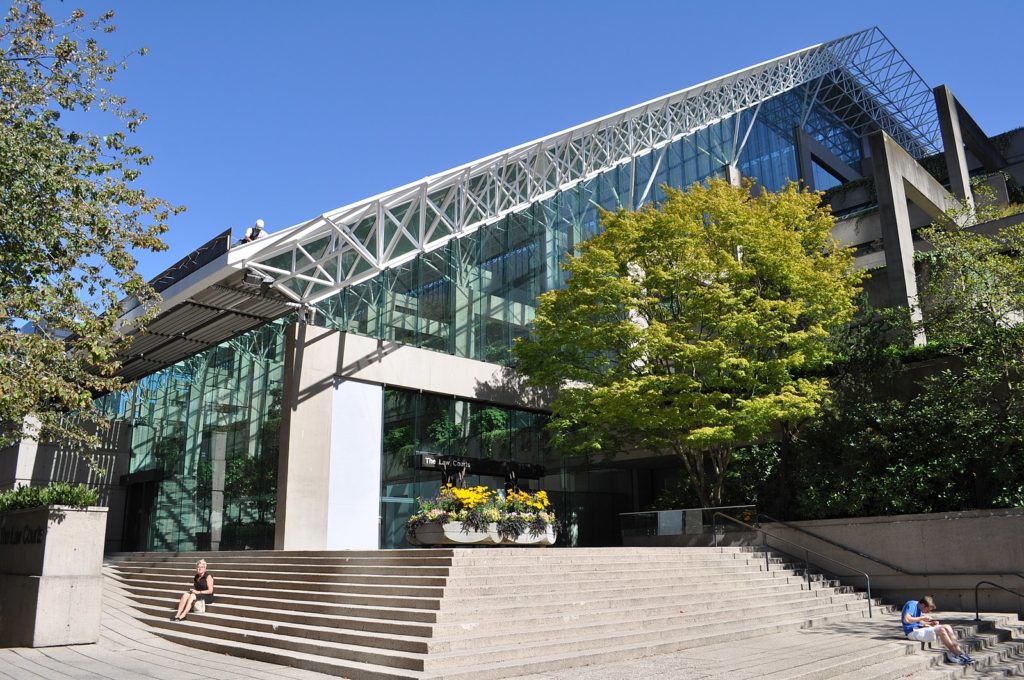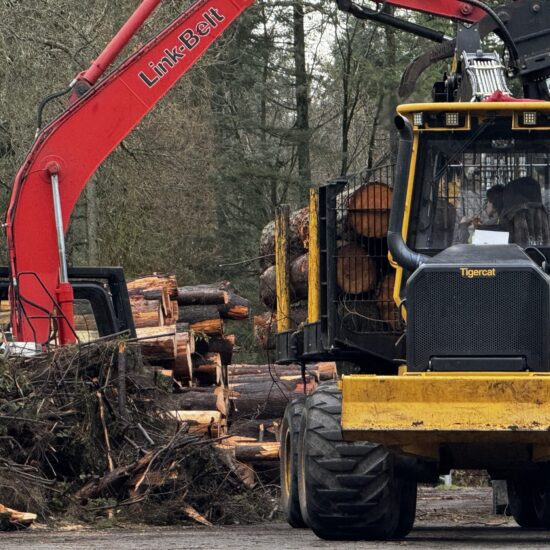
Bob Mackin
A lawyer for Vancouver city hall told B.C. Supreme Court on April 20 that a public hearing was not necessary for city council to approve the Senakw services agreement.
“The council may authorize those transactions, in camera, without the scrutiny of the public, where disclosure could reasonably be expected to harm the interests of the city,” Iain Dixon said before Justice Carla Forth at the Law Courts.

Law Courts Vancouver (Joe Mabel)
The Kits Point Residents Association is contesting the legality of the 120-year agreement between city hall and the Squamish Nation’s Nch’kay Development Corp. KPRA and two of its directors filed a petition last October for a judicial review because the city made the deal behind closed doors and never gave citizens a say. They want the judge to quash the agreement to service the cluster of residential towers to be built on the Squamish Nation reserve around the Burrard Bridge’s south side.
The city maintains it acted properly under both the Indian Self-government Enabling Act and the Vancouver Charter.
Dixon called it a “highly unusual situation of a development on land within the geographic boundaries of the municipality, but not within the jurisdiction of the municipality.”
Dixon said the judge does not have to decide if closed meetings for this agreement were correct, but that they were reasonable.
“The decision as to whether to close the meeting, to consider the in camera report, was that a reasonable decision? And the reasonableness goes to both to the interpretation and application of the facts, to the legislation that was required,” Dixon said.
The Supreme Court of Canada has held that a reasonable decision has to make sense in light of the law and facts, while a correct decision Is the only right answer.
Dixon said that city council and staff reasonably feared that the glare of publicity would undermine business planning, negotiating and dealmaking.
He said the substantive resolution involved council considering whether to enter into a contractual relationship with the Squamish Nation, to provide the services to a proposed development on land that is not subject to regulation by the City of Vancouver.
“In arriving at this decision, council must consider the authority to enter into the agreement along with the potential impacts on the city of both entering into the proposed agreement and of not entering,” Dixon said.
He said the decision was made by elected councillors who are subject to elections periodically. It was also a decision that was not adjudicative or quasi-judicial.
“This is a policy-based decision that has effects on the entirety of the City of Vancouver, not just the Kits Point community,” he said.
Nch’kay is partnered with developer Westbank Projects Corp. on the federally approved project.
The 250-page agreement spells out how Senakw will connect to the city’s water and storm sewers, sidewalks, roads, bike lanes and public transit, and who pays for what. An appendix lists $48.43 million of costs estimated for 15 street, bike lane, sewer and seawall projects, mostly paid by the Squamish Nation. Of that, $15 million is the estimate to build a transit hub on the bridge.
Last May 25, then-Mayor Kennedy Stewart and Squamish Nation council chair Dustin Rivers, aka Khelsilem, signed the agreement at an on-site photo op. But the city and Squamish Nation law firm McCarthy Tetrault agreed a day earlier to keep the document secret until at least June 3 while it underwent further review and negotiation. The city’s court filings said negotiations on final terms continued until July 19. The agreement was quietly added to the city website on the eve of B.C. Day long weekend. No public announcement was made.
Westbank began work last summer on the first phase of the four-phase project. At the Sept. 6 groundbreaking, Prime Minister Justin Trudeau announced a $1.4 billion loan through Canada Mortgage and Housing Corporation to finance half the units in the first two phases.
A 2019 expert report for Squamish Nation members estimated the project could bring as much as $12.7 billion cashflow for the band and developer.
Support theBreaker.news for as low as $2 a month on Patreon. Find out how. Click here.











